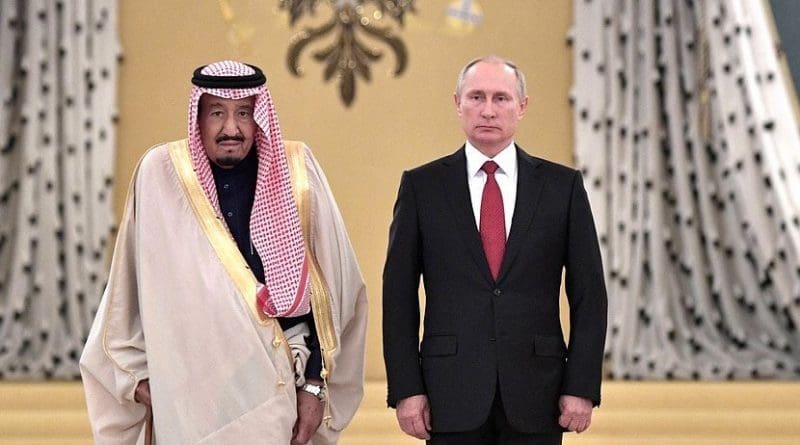Russian-Saudi Entente: Shifting Geopolitical Scenario Of Middle East – Analysis
It was indeed a landmark moment when Saudi Arabia’s King Salman bin Abdul Aziz landed in Russia with an entourage of 1,500 people to ink various preliminary agreements and discuss regional issues, the first reigning Saudi monarch to do so since the establishment of their relations in 1926.
The visit portends significant changes in the geopolitical landscape of the conflict ridden Middle East, with Russia increasingly being accepted as credible role player in shaping events thereby effectively outplaying the US.
During the four day trip several projects ranging from space exploration, nuclear energy, oil and most importantly arms deals worth $ 3 billion dollars were agreed upon. Under the arms deal Saudi Arabia would buy the S-400 air-defense system, antitank Kornet-EM rocket systems, TOS-1A (multiple rocket-launcher) systems, AGS-30 automated grenade launchers, and Kalashnikov AK-103 assault rifles.
Moreover, leaders of the two largest oil producing states also developed consensus to coordinate their efforts in production and supply of Oil so that stabilization in the dwindling oil prices could be ensured. Cooperation in these domains may help Saudi Arabia diversify its predominantly oil based economy while providing Russia crucial leverage over US in dealings with one of the largest oil producing country which also has considerable influence over other Gulf monarchies.
The visit surprised many of those aware of the troubled history of Saudi-Russia relations. Despite the fact that the erstwhile Soviet Union was the first state to recognize the kingdom of Hijaz and Najd (name of KSA until 1932), the two states mostly found themselves on opposite sides on various regional and international matters, particularly during the cold war era. Lately, the Syrian conflict witnessed the two supporting rival groups, Russia backing Assad regime and Saudi Arabia backing the rebels. Thus, in this backdrop, visit of a long-time ally of US to one of its longest and fiercest opponents reflects shifting geopolitical realities and Russia’s successful demonstration of its military and diplomatic clout in Middle Eastern politics.
The potential shift in balance of power can partly be attributed to the relative disengagement of the US from Middle East starting with Obama administration, and its nuclear agreement with Iran. This has disillusioned Israel and Saudi Arabia (staunch opponents of Iran). Currently, President Donald Trump’s apparent failure to evolve any effective Middle East policy has further alienated US allies in Middle East, thus giving way to Russian ingress.
A region deeply divided on religious, ethnic, sectarian and political lines cannot be dealt as a single entity as has been a cardinal feature of US Middle East policy. This inherent weakness of US Middle East strategy was exposed when Qatar, host to largest US military base, faced diplomatic isolation in Jun this year by Gulf Cooperation Council (GCC) nations. US support for either party entailed risk of alienating one ally at the cost of others and hence it’s reluctant response at the price of being perceived as weak, unreliable or at worse useful to none.
Yet another reason that explains the emerging geopolitical shift on the horizon of Middle Eastern politics is the fact that Russia has effectively capitalized on failures and policy confusions of the US and has adopted a more flexible approach. This has enabled Russia to interact with all the stakeholders without losing credibility. For instance, Russia has been persuasively reassuring Israel regarding its concerns that Iran may use Syrian territory as a military base to attack the Jewish state, while at the same time allowing Iran’s presence in Syria.
In the case of Syria, by turning the tide against anti-Assad forces and establishing de-escalation zones Russia has proved its military and diplomatic clout. Thus, Saudi King’s expressed desire to reach a final agreement on regional issues including Syria during his meeting with Russian President Vladimir Putin is reflective of the realization that his country can no longer afford to ignore Russia. This realization may result in an agreement between the warring factions over Syria and thereby restoring a fragile balance and status quo.
Saudi Arab seeks to secure its interest vis-à-vis Iran and other potential regional rivals by diversifying its alliances and ameliorating its relations with Russia. The Kingdom feels threatened by Iran’s growing missile program and its regional influence as manifested in the form of Iran’s military and financial support to Houthi rebels in Yemen and Bashar al Assad regime in Syria. Thus, considering the common grounds Russia shares with Iran, it’s not inconceivable that in future Russia would act as a mediator and bridge between the two which are engaged in deadly proxy wars against each other. This would require Saudi Arab to stop kowtowing dictates of US and strike a difficult balance between Russia and US in the region. In reciprocity Russia has to ensure that Iran avoids interfering in the Saudi circle of influence. This is challenging but not impossible.
Thus the changing geopolitical arena of Middle East, characterized by waning US hegemony and growing Russian influence, appears to herald a new chapter not only in Russia-Saudi relations but also the larger balance of power equation in the volatile and war ravaged Middle East and Persian Gulf.
The fact that unlike US, Russia has a flexible and more inclusive rather than ideologically burdened strategy for Middle East suggests its prudence and this appears to be the source of its strength instead of weakness. Contrary to US, which has wrought havoc in Middle East in the name of human rights, democracy and terrorism, Russia has presented itself as a stabilizer, balancer and an effective deterrent to unilateral, interventionist policies of the US. However, this needs to be seen whether Russia would be able to keep the source of its strength and credibility intact in the long run by keeping balance between some of the historical and arch rivals; for instance, Iran and Israel, Iran and Saudi Arabia.
*Nisar Ahmed Khan is a Research Affiliate at Strategic Vision Institute (SVI).

